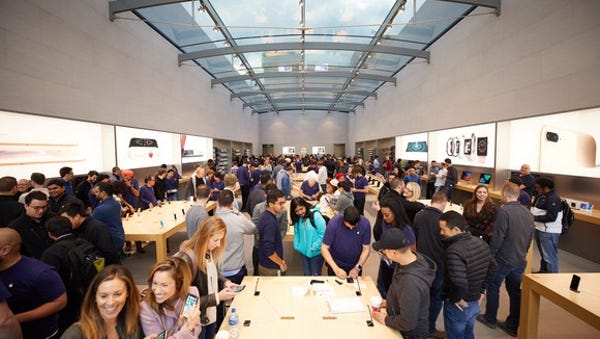| Say so long to the small smartphone? |
| Let's take a moment this weekend to praise and fondly remember the compact smartphone. |
 |
| The little iPhone SE, with the 4-inch LCD screen, is a classic of another era and seems to be the last of its breed, one we may never see again. |
| This week, Apple confirmed its next launch event, set for Sept. 12, where the company's next crop of iPhones are expected to be the biggest ever – 6.5 inches for the top of the line premium model and 6.1 inches for a new, lower-priced, but premium model. That compares to 5.8 inches for the current iPhone X and 5.5 inches for the iPhone 8 Plus. |
| This megaphone trend has been playing itself out for several years now. Phones are getting larger and larger, and the folks who prefer the small models, well, to them we say that it's called progress, right? |
| |
| Beyond the iPhone, the current top-of-the-line Samsung phones are 5.8, 6.2 and 6.4 inches. The best-selling phone in Asia, the Xaomi Redmi Note 5, is 6 inches as well. |
| Big clearly sells with the public. |
| But let's get real – small has its place, too. A phone such as the SE fits in your pocket snugly. It's cute. It's compact. It's cheap! Apple sells the SE for $350, compared to the largest phone in its current lineup, the iPhone X, which starts at $999. |
| Apple may sunset the SE with its new product launch, just as it has retired other products of the past (think classic iPod) or features we loved (high on that list is the headphone jack on iPhone and the CD/DVD drive on Mac computers). |
| I like a big screen as much as the next guy, but, please, I also love diversity and choice. I loved the iPod, others swore by the Blackberry. We miss them. And we'll miss the small phone, too. Please don't take it away. |
| (Before you read on, be sure to click here to watch this newsletter come to life in video form:) |
In other tech news this week |
| • Politicians went after tech. President Donald Trump took on Google this week, saying the search results were biased against conservatives. And former presidential candidate Bernie Sanders went after e-commerce giant Amazon, arguing the company treated its workers unfairly. Both companies fought back, with Amazon denying Sanders' charges and Google saying its mission is to provide "high quality" content, without any bias. |
| • In other Google News, the search giant added bilingual features to the Google Assistant, the personal helper found on Android and iOS phones and the Google Home connected speaker. After a quick setup, the Assistant will be able to answer you when you speak to it in any two of these languages: English, German, French, Spanish, Italian and Japanese. More languages are to follow. Assuming it works as promised, it will answer in the language you used for the question. The new feature began rolling out this week. |
| • E-scooters were welcomed back to San Francisco. Scoot and Skip, two companies most folks probably haven't heard of, were granted one-year permits to operate in the city, while Bird and LIme, the most popular firms, didn't get approved. The app-accessed electric scooters are still banned in many California cities, including Beverly Hills and Manhattan Beach. |
| • The latest in the Elon Musk saga: He mused publicly in a tweet why a Thai diver hasn't sued after his initial tweet accusing the diver of being a "pedo" for trying to rescue young boys who were stuck in a Thai cave. |
| This week's Talking Tech podcasts |
| Three reasons to try mobile pay |
| What to do when you run out of storage room on your phone |
| How the Google rankings really work |
| The next iPhones will be bigger than ever |
| Alexa, which of the 7 Echo speakers should I buy? |
| Thanks for reading the Talking Tech newsletter. You can subscribe at technewsletter.usatoday.com. Also be sure to listen to the daily Talking Tech podcast on Stitcher, Apple and Google podcasts, and follow me (@jeffersongraham) on Twitter, Instagram and YouTube. |







No comments:
Post a Comment